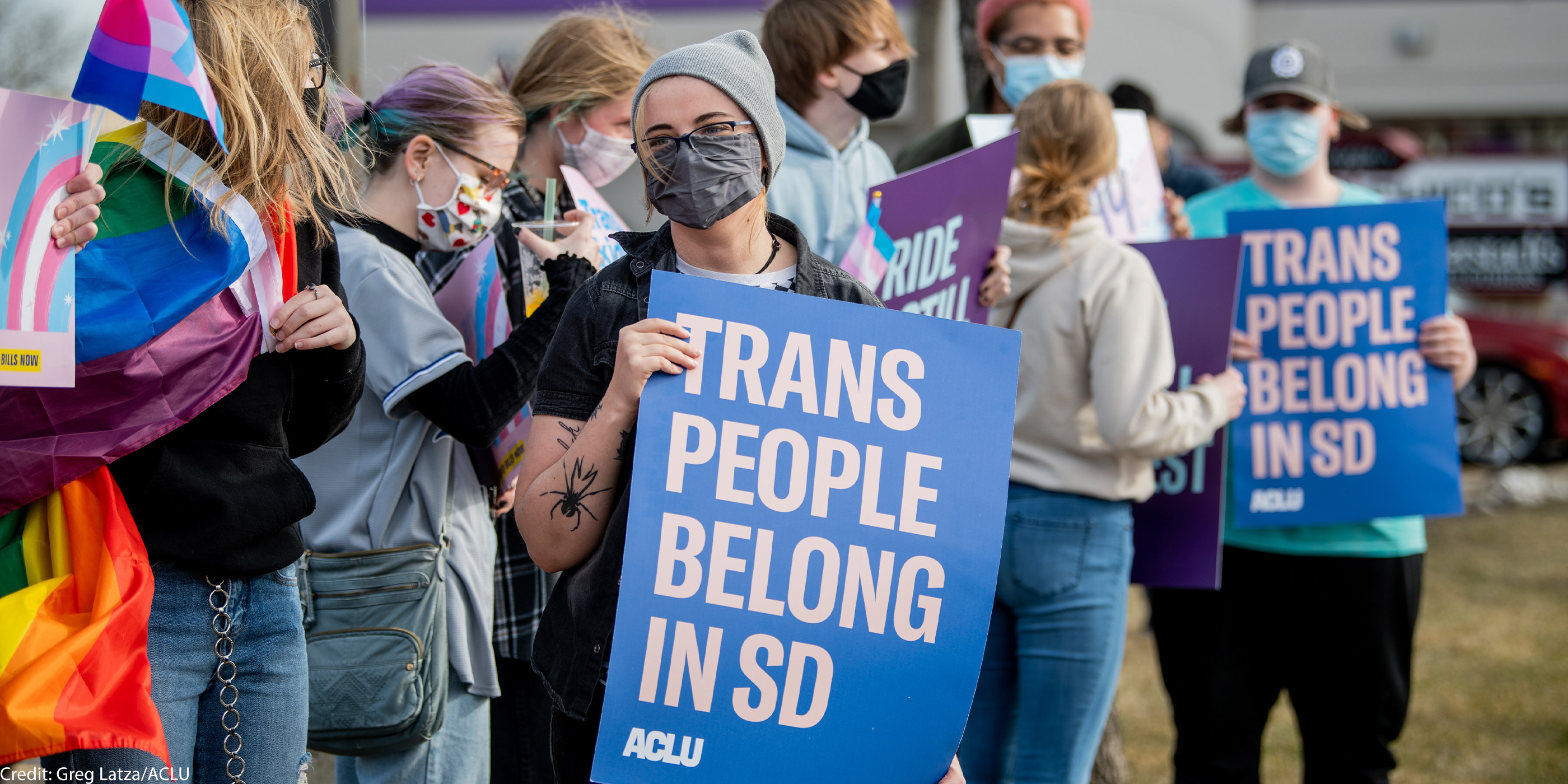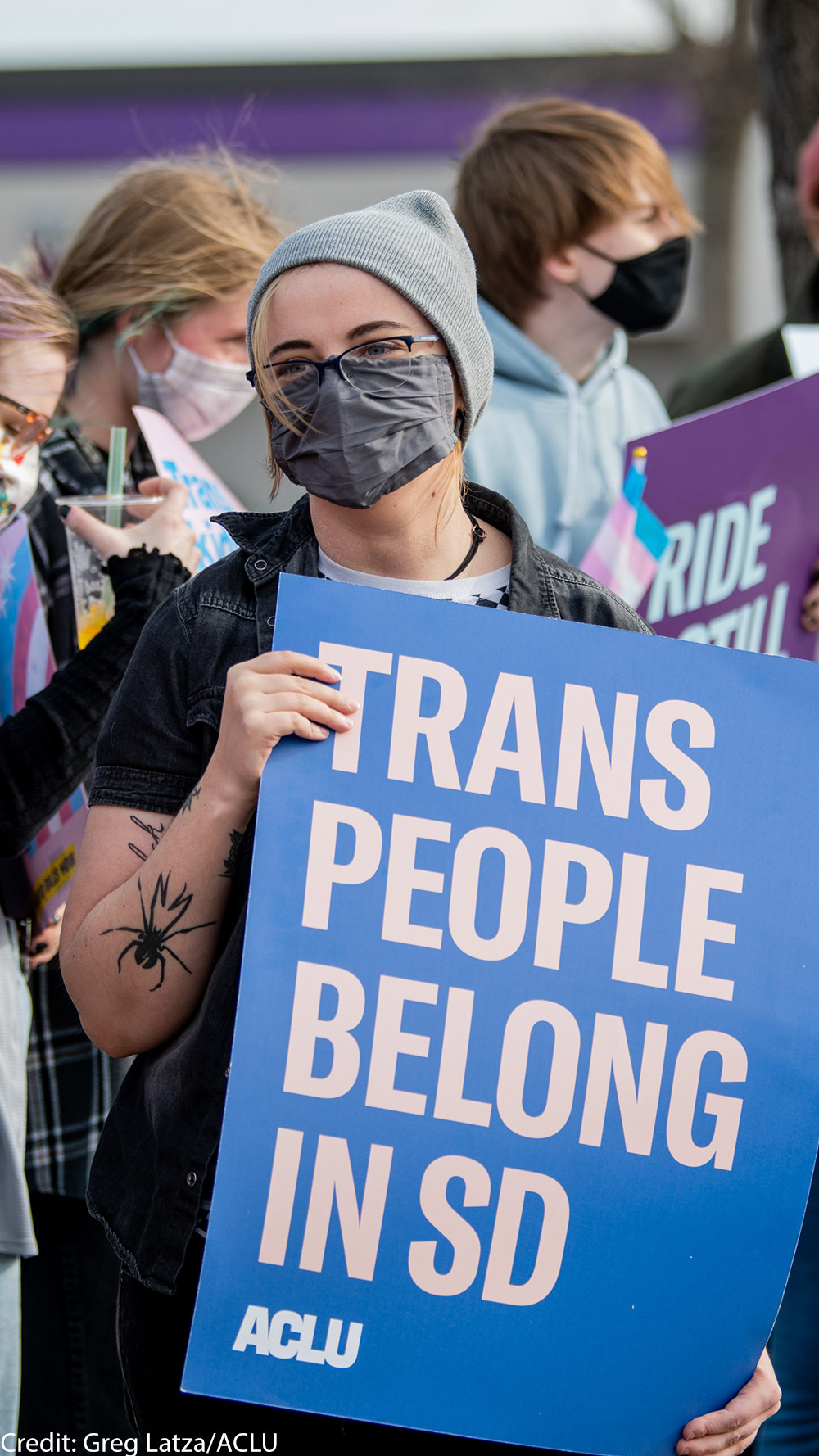In 2021, Our Fight for LGBTQ Rights Moved to the States


Several great strides for LGBTQ rights were made in 2021, but we also encountered an unprecedented upsurge in discriminatory legislation. Our vision of a world where LGBTQ people can truly live freely and openly is far from reality, particularly for LGBTQ people of color as well as trans and non-binary people. This year saw the passing of Jim Hormel, who helped start what is now the ACLU’s LGBTQ & HIV Project, and we also gained confidence that our work will continue thanks to the generosity of Jon L. Stryker and Slobodan Randjelović.
Here are some of the highlights — and lowlights — of 2021 in LGBTQ rights.
Biden Acts to Protect Trans Rights
On day one of his administration, President Biden issued an executive order directing all federal agencies to recognize that existing federal bans on sex discrimination protect against LGBTQ discrimination as well. This order recognized the incredible victories won by Aimee Stephens, Don Zarda, and Gerald Bostock at the Supreme Court in 2020, as well as many other victories by LGBTQ people in other courts.
On January 25, President Joe Biden repealed the transgender military ban enacted by the Trump administration. The ban was the subject of multiple lawsuits including Stone v. Trump which was filed by the ACLU, the ACLU of Maryland, and Covington & Burling LLP on behalf of six transgender members of the armed forces.
As we’ve seen before, however, a more supportive federal government means those who are opposed to LGBTQ equality moved their fights to the states.
More Anti-Trans Bills Were Introduced and Passed in 2021 Than any Other Year
2021 set a record for the most anti-LGBTQ bills passed during a legislative session. Over 100 anti-LGBTQ laws were proposed in 35 states around the country, and these bills overwhelmingly targeted trans youth. While the attacks differ — some would ban medical care for trans youth, some would ban trans youth from school sports, and others would make it harder for trans people to get accurate state IDs — they are not isolated. They represent a coordinated campaign to push trans people out of public life.
The ACLU has filed lawsuits in Arkansas, Idaho, Montana, Tennessee (twice), and West Virginia challenging laws passed since 2020. These lawsuits have already blocked enforcement of unconstitutional laws attacking trans people in four states.
Wins for Accurate Gender Markers on IDs
After years of advocacy by transgender, non-binary, and intersex people, the Biden administration in June announced that the Department of State will now update the gender marker on passports without requiring medical documentation, and will add an “X” designation option. In January, the ACLU launched its largest-ever campaign targeting the federal government on LGBTQ rights to urge the Biden administration to issue an executive order on accurate federal IDs across all federal agencies. Nearly 100,000 Americans contacted the White House in support of access to accurate IDs for all people, alongside a coalition of over 80 advocacy organizations and several Congressional offices.

They The People: Accurate Gender Markers for All
The latest on They The People: Accurate Gender Markers for All
Source: American Civil Liberties Union
A federal court sided with our clients Darcy and Destiny in January, finding that Alabama’s driver’s license policy, which refuses to provide accurate gender markers on licenses belonging to transgender individuals, violates the rights of transgender people. The state appealed and we expect an argument to be scheduled before a federal appeals court soon.
And in late March, The New York Civil Liberties Union and Legal Services of NYC sued the New York State Office of Temporary and Disability Assistance on behalf of our clients Jules and Jaime for discriminating on the basis of gender identity against non-binary New York residents by barring non-binary people from applying for or receiving benefits using an accurate gender marker.
Trans Women Fight Abuse in the Criminal Legal System
In New Jersey, the Department of Corrections recently to adopt a system-wide policy to help protect transgender, intersex, and non-binary people in prisons. This was the result of an agreement settling a civil rights suit brought by a woman who was forced to live in men’s prisons for a year and a half, represented by the ACLU of New Jersey.
In Illinois, a federal court the Department of Corrections to take immediate steps to improve housing and health care conditions for transgender people. The ACLU of Illinois brought a class-action lawsuit on behalf of transgender women. In the trial, Sora Kuykendall said:
“during strip searches I would break down and cry and shake, and when I would get back to my cell I would do the same.”
Supreme Court Again Refuses to Rule That the Constitution Protects a License to Discriminate
For the second time in three years, the Supreme Court once again refused to rule that there is a constitutional license to discriminate. The case involved Catholic Social Services, a taxpayer-funded foster care agency, which had sued Philadelphia claiming a constitutional right to discriminate against qualified same-sex parent families because of a religious objection. The ruling means other taxpayer-funded government programs such as homeless shelters, disaster relief programs, and health care should continue to ensure that LGBTQ individuals have equal access to necessary social services. And for the over 400,000 children in foster care across the country, the ruling will help ensure that placement decisions are made in the child’s best interest rather than based on an agency’s discriminatory beliefs.
Expanding Access to Gender-Affirming Care
Doctors agree that gender-affirming care is lifesaving care. Both courts and the federal government have agreed for much of the past decade that denying gender-affirming care is discrimination. Yet many private insurance companies and state-funded health care programs still turn trans and non-binary people away when they seek this medically necessary care.
Our lawsuit in — on behalf of Mika Covington and Aiden Vasquez — and our advocacy in — on behalf of Charley Osman — have led to changes in discriminatory policies. And the Supreme Court refused to hear a case that could have opened the door to even more discrimination in health care.
Shon Thomas and Gwendolyn Cheney of Georgia are still waiting for an end to their state’s ban on Medicaid coverage for gender-affirming care.
Financial Institutions Told to Stop Discriminating Against Sex Workers
MasterCard recently instituted a new and restrictive policy targeting adult content websites. This is bad news for many sex workers, whose safety and livelihoods depend on access to financial services and online platforms. The policy makes it harder for sex workers to do business online and makes sex workers more vulnerable, especially those who are trans women of color.
We’ve mobilized thousands of people who want to see MasterCard change their policies. Decriminalizing and destigmatizing sex work is key to ending the violence and harassment so often faced by sex workers.

We also took action to end discrimination towards trans and non-binary workers at , Alaska Airlines and .
Gavin Grimm Finally Wins
The Supreme Court declined to hear Grimm v. Gloucester County School Board, a victory for Gavin Grimm. Years after Gavin first spoke in front of his school board, and after multiple courts ruled in his favor, it was finally clear that his school violated federal law when Gavin was prohibited from using the same restrooms as other boys.
Unfortunately, not all Virginia lawmakers have gotten the memo that trans people belong in schools. In spite of Gavin’s victory and a new state law, the ACLU of Virginia recently the Hanover County school district for refusing to protect transgender students. A similar suit was by the ACLU of Indiana this year.
In 2022, we expect attacks on trans youth to continue: those who fought against marriage equality shifted to bathroom bills, then sports, then health care and now they are working to and curriculums that acknowledge the existence of trans people.
We will need your voice and your support to respond to these attacks in 2022 and beyond.

